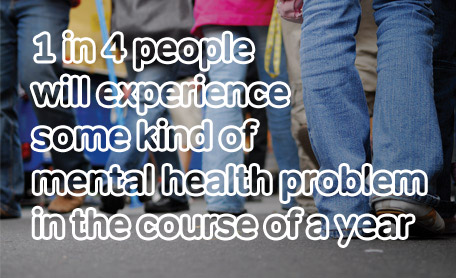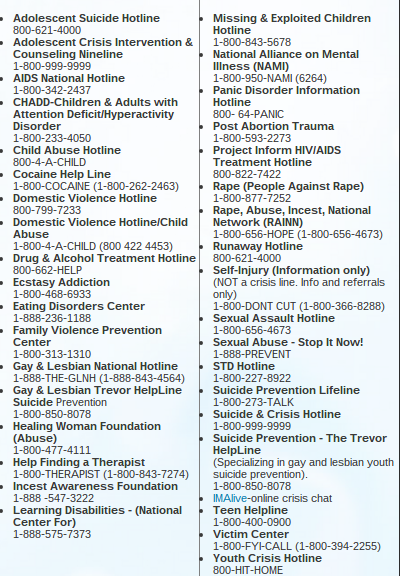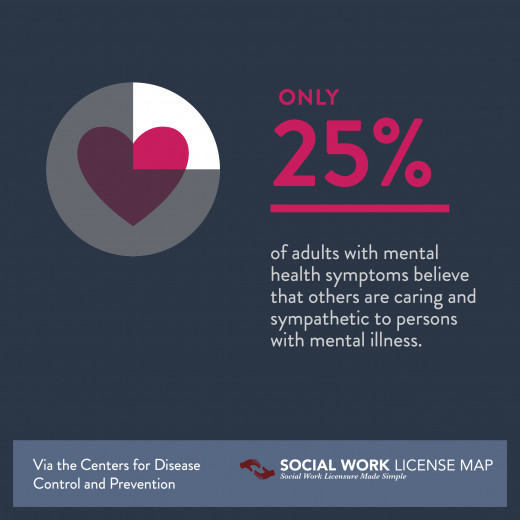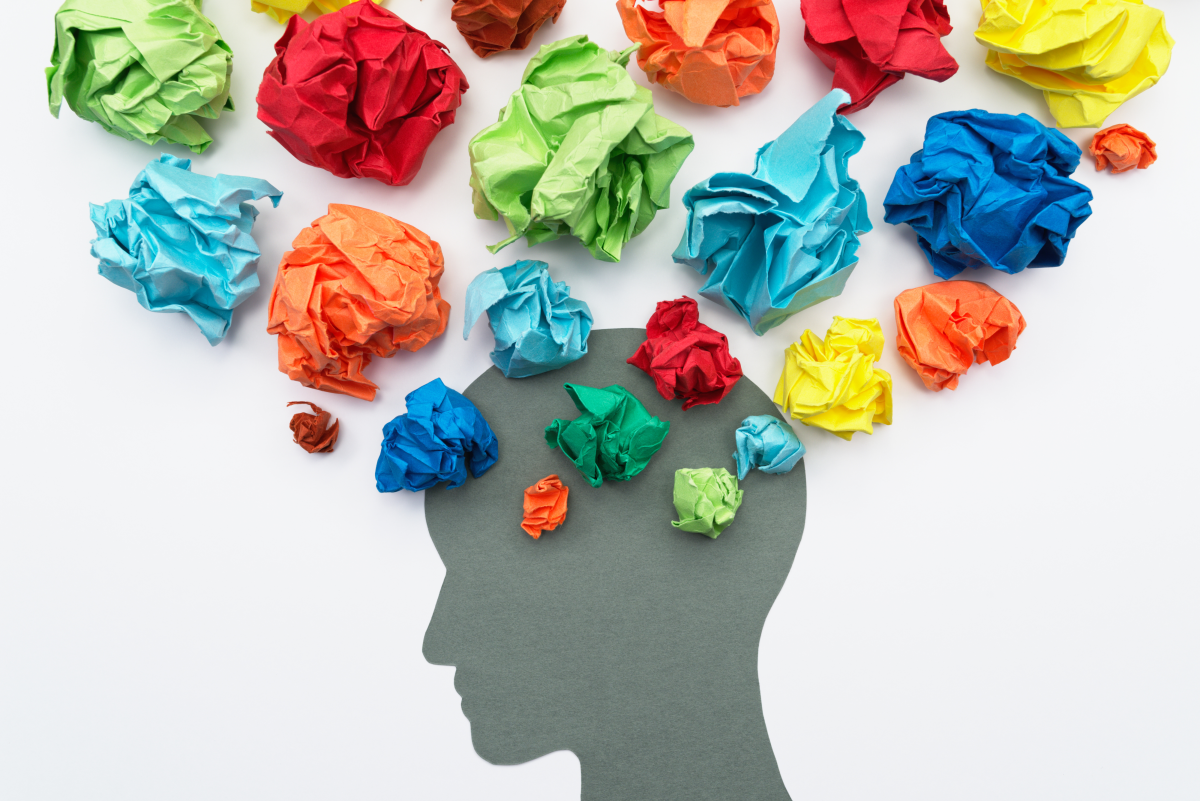Living With Mental Illnesses
Identifying Mental Illnesses
Did you know that about 1 in 4 adults will suffer from some sort of mental illness in a year? About 61.5 million american's will have some kind of mental illness. The person next to you may have some kind of mental disorder and you wouldn't even know. They themselves may not even know it. Up to 50% of mental illnesses aren't diagnoses or treated.
It's important, when you have a friend or family member with a mental disorder, to know what it is that they have, so that you can better understand what they are going through. Mental disorders come in different forms and differ from person to person.
Let's highlight some of the most common mental illnesses and disorders:
- Anxiety: This is when panic or fear sets in. It usually comes with increased heart rate, rapid breathing, sweating, shaky behavior, and a feeling of dread. It is hard to go on and act normal when in the midst of an anxiety attack. This includes panic disorder, social anxiety, and phobias.
- Mood Disorders: This is where depression and bipolar disorder fall into. This is feelings of overwhelming sadness or mood fluctuations. It is hard for someone who fall into this category to control their feelings.
- Psychotic Disorders: Schizophrenia is the main psychotic disorder that people know of. Hallucinations, hearing and seeing things that aren't actually there or happening, are the main symptom of psychotic disorders. Delusions are also a big symptom of psychotic disorders.
- Eating Disorders: Not many people really think about eating disorders being a mental illness. Anorexia, Bulimia, Binge Eating are all considered a mental illness. People suffering from these things think a different way and suffer from seeing themselves a certain way. They don't usually see themselves, body wise, as they truly are and don't know of a way, or any other way, to change them into something that they feel is good enough.
- Addiction and Impulse Control: Pyromania, Kleptomania, and gambling fall into this category. It involves thinking and doing actions without impulse. They may know that it's wrong or shouldn't be done but can't help it and feel that they need to do it anyway. People with addictions and impulse control issues
- Personality Disorders: People with personality disorders suffer from problems with extreme personality traits that they cannot control. These usually cause them to act differently and causes problems in their everyday life. Anti-social personality disorder, obsessive-compulsive disorder, and paranoid personality disorder are the most common problems people suffer from.
- Obsessive-Compulsive Disorder (OCD): Obsessive Compulsive Disorder, or OCD, comes in many different strengths. It can be something small that they do, or it can control their entire lives. They need to do things a certain way or a certain number of times. They have to do things in a sort of ritual form or routine. Some people know of the example of germaphobes having to wash their hands a certain amount of times or a certain way.
- Post-Traumatic Stress Disorder (PTSD): This can start to effect people after they've gone through a traumatic experience such as sexual or physical assault, loss of a loved one suddenly or even a natural disaster. They have bad or scary thoughts and memories of the event that may plague them for the rest of their lives.
There are a number of other illnesses and disorders that fall into the category of mental illnesses. To see a full list, go to WebMD to get the full list and information.
What is Mental Illness?
Dealing With An Anxiety Attack
It's not always easy to know what to do when someone around you, or you yourself, are having an anxiety attack. They can range from severe to simple rapid breathing. Either way, it's a good idea to understand ways to help yourself or someone in your life going through it.
Anxiety can strike suddenly and out of no where or can creep up slowly over a matter of minutes in certain situations. Here are a few ways to keep someone calm in a moment of an anxiety attack:
- Ask if the person has a medication they take in anxiety moments; if they do, ask where it is and get it for them.
- Move them to a quiet and/or calm environment.
- Don't crowd them but make sure they know you are there.
- Tell them to breathe, take deep breaths with them, have them follow your breathing. You can even have them put their hand on your chest to feel your breathing to help steady them as they try to calm their own breathing.
- A cold glass of water can sometimes help calm them.
- Make sure that you keep calm. You panicking will make them panic more and will worsen the situation.
It's very important that they know you are there to help them and to calm them. Don't just leave them alone, even if that's what they say they want. Do not leave until their breathing is back to normal, at least. They can easily pass out and hyperventilate, causing them to hurt themselves possibly. It's important that their breathing gets back to normal as soon as possible.
If you yourself are having an anxiety attack, go to a quiet place, somewhere that you are comfortable and can sit down. Put your hand on your chest and take deep breaths in and out. Close your eyes and focus on nothing but your breaths. Deep breaths in and out, counting to 10 helps as well. Keep your mind off whatever it is causing panic and just focus on the deep breaths. Hopefully, within minutes, your breathing should be back to normal and the attack should be over.
Staying relaxed and calm is one of the most important things to do. Panicking about an attack will make it worse and you will hyperventilate and that is never a good situation.
If you're someone with a loved one with anxiety, it's important to remember that this is not something they can control. They do not ask to have these attacks, they are not pleasant. They are not doing this for attention, they are having serious problems and need attention and help for it.
Do not hold anxiety against a person.
If someone says that they can't do something because of their anxiety, respect that. Do not push them to go somewhere, or talk to someone, or do something, that they say they cannot do because you think 'it will help'. It will not, it will just make things worse and no one will be better off. It's best for them to do things like that on their own time instead of being forced to do it on someone else's terms.
It is important that if you have severe or frequent anxiety attacks to see a doctor. There are medications they can put you on or therapists you can see. They can help you find personalized ways to deal with your attacks, as what works for some don't work for everyone all the time. It's best to see a professional when dealing with anxiety, they will know how to help you best.

Having Depression
Having depression doesn't just mean that you are just sad sometimes or having a bad day. Depression is an everyday suffering that people go through. Having just one bad day shouldn't be labeled as having depression. Depression is something serious that can ruin and even take lives and labeling someone depressed should be treated carefully and not treated lightly.
Depression comes with a number of symptoms, not just sadness. The other symptoms to identifying depression include:
- Messed up sleeping schedule(Not sleeping at all, very little, or sleeping all the time)
- Change in appetite(Loss or increase)
- Trouble with concentration
- Feeling hopeless or helpless
- Overwhelming and Uncontrollable negative thoughts
- Increased irritability
- Increase in reckless behavior/drinking to access
- Thoughts that life is not worth living or there is no point in life
If you feel like life is no longer worth living or do not see the point in it anymore, seek immediate professional help from a doctor or counselor. They can get you the help that you need.
Sometimes, you may be having symptoms of depression even if things in your day to day life is going fine. Depression doesn't just happen when something bad happens or bad things are happening. It does increase with things like that but you can be feeling symptoms of depression even on what should be a good day.
Something important to remember when it comes to depression is that it's not a flaw in character. Depression does not mean that there is something wrong with you as a person. Depression is a chemical imbalance in the brain, which causes problems with mood and other things. That is why some can only get better with medication and there isn't anything wrong with that.
No one can control if they have depression or not. Even someone who does what they love to do everyday can be struck by depression. There are a number of reasons one can get depression.
To learn more about the reasons depression can effect someone, head over to WebMD to read all about it.
How does one get on day to day while dealing with depression? There are a few things one can do to keep their depression under control.
- Therapy or Counseling - If you don't want to talk to a professional at first, opening up to a friend or family member about how you are feeling and what is happening can also help a lot. Opening up about it to someone in general can really be a big relief and help a lot and make you feel not so alone. Therapy and talking to a professional can be scary but they can help you find ways personalized to you that will help you function with your depression and it gets easier as time goes on and you get used to this person.
- Exercise - Getting your body moving is an amazing way to fight depression. The blood flow will give you more energy which will make you feel better and fight off the bad feelings. Dance, take your dog for a walk, play with the kids, go for a run, do some ab exercises or some cardio, or use the stairs instead of an elevator. Yoga is also an amazing way to ground yourself and fight depression
- Do things you enjoy - Read a book, cook, watch a movie, play with your animal, play an instrument. Whatever brings you happiness, whatever you enjoy doing, do that more or find more things that you enjoy doing. Keeping yourself busy with the things you enjoy will fight of depression.
- Eat Healthy: Eating a healthy and well balanced diet will keep your body healthy and in good condition which in turn will help you feel better. Don't stuff yourself with junk food while curled up on the couch for hours. Your body will drag and feel gross, which will not help how you feel.
Is there someone around you, a friend of family member, suffering from depression? If so, the best thing that you can do for them is listen. Pay attention to how they act, see what moments bring them happiness and try to keep that going. Make sure that they know you are there for them.
They really need to know that they aren't alone. It will be hard for them to understand that you are there and will probably push you away at first, but just make sure to be there when they do need you.
Depression makes the person feel lost and alone and you as a loved one need to make sure they know that's now true and that they have someone who will always be there for them.
For more information on helping a person with depression, head over to HelpGuide.org for more information.
Living With A Mental Disorder
Help Hotline Numbers

Mental Health By Numbers from National Alliance on Mental Health
- Approximately 1 in 25 adults in the U.S.—10 million, or 4.2%—experiences a serious mental illness in a given year that substantially interferes with or limits one or more major life activities.
- Approximately 1 in 5 youth aged 13–18 (21.4%) experiences a severe mental disorder at some point during their life. For children aged 8–15, the estimate is 13%.
- 1.1% of adults in the U.S. live with schizophrenia.
- 2.6% of adults in the U.S. live with bipolar disorder.
- 6.9% of adults in the U.S.—16 million—had at least one major depressive episode in the past year.
- 18.1% of adults in the U.S. experienced an anxiety disorder such as posttraumatic stress disorder, obsessive-compulsive disorder and specific phobias.
- Among the 20.2 million adults in the U.S. who experienced a substance use disorder, 50.5%—10.2 million adults—had a co-occurring mental illness.
Consequences of Lack of Treatment
- Serious mental illness costs America $193.2 billion in lost earnings per year.
- Mood disorders, including major depression, dysthymic disorder and bipolar disorder, are the third most common cause of hospitalization in the U.S. for both youth and adults aged 18–44.
- Individuals living with serious mental illness face an increased risk of having chronic medical conditions.17 Adults in the U.S. living with serious mental illness die on average 25 years earlier than others, largely due to treatable medical conditions.
- Over one-third (37%) of students with a mental health condition age 14–21 and older who are served by special education drop out—the highest dropout rate of any disability group.
- Suicide is the 10th leading cause of death in the U.S.,20 the 3rd leading cause of death for people aged 10–2421 and the 2nd leading cause of death for people aged 15–24.
- More than 90% of children who die by suicide have a mental health condition.
- Each day an estimated 18-22 veterans die by suicide.
- See more at: https://www.nami.org/Learn-More/Mental-Health-By-the-Numbers.aspx

Coping and living with a mental illness, or living with someone who has one, can be tough. There are a lot of ups and downs, and sometimes the downs can be very scary and bad but it's important to support them no matter what.
People with mental illnesses cannot control some of their actions or the way that they think or do things and it's important to remember that and not hold some of the things they feel or do against them.
Having a good support system, people that understand you can't control how you feel, is very important. It's scary to not be able to control your feelings or even sometimes actions and it's important to have people around you that understand that and stand by you no matter what happens.
If you think you suffer from an above mentioned mental illness, go to your doctor and explain your feelings. They can get you in contact with certain doctors or therapists that can help in your situation, or they themselves can start you on medications or some kind of treatment that will get you on the road to being able to live with your mental illness.
It is very possible to have a normal life with a mental illness. It's not the end of the world if you are diagnosed with one, and you shouldn't beat yourself up over it.
You aren't alone while suffering from these disorders. It feels like it sometimes, but there are always people, a support system, somewhere out there.








